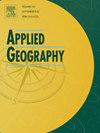Regional entrepreneurial spirit and global value chains participation in Chinese cities: the moderating role of digital transformation signals
IF 5.4
2区 地球科学
Q1 GEOGRAPHY
引用次数: 0
Abstract
Previous studies have focused on the impact of factor endowments, market size, geography, institutional quality, and new technologies on participation in the Global Value Chains (GVCs). However, the role of regional entrepreneurial spirit, which reflects local agency in arbitrage and innovation, has been largely ignored in shaping value-related economic activities. At the same time, new digital technologies provide the “opportunity window” for both firms and regions in the era of the digital economy. The issue of how regional entrepreneurial spirit exerts influence on global economic participation under the context of digitalization is worthy of further investigation. Thus, this study attempts to investigate the impacts of regional entrepreneurial spirit on local GVCs participation in China as well as the moderating role of digital transformation signals. With a big dataset matching from diversified sources, we find that regional entrepreneurial spirit has a significantly positive influence on local GVCs participation, which is moderated by the digital transformation signals from leading firms and local governments. In the early stages, the positive moderating effect from local governments is more stable and reliable, while leading firms' signals become more crucial in the latter stages. Furthermore, this moderating effect is more pronounced in cities with higher level of inclusiveness.
中国城市的区域创业精神与全球价值链参与:数字化转型信号的调节作用
以往的研究主要关注要素禀赋、市场规模、地理位置、制度质量和新技术对全球价值链参与的影响。然而,在形成与价值相关的经济活动中,反映套利和创新的地方代理的区域企业家精神的作用在很大程度上被忽视了。同时,新的数字技术为企业和地区在数字经济时代提供了“机会之窗”。在数字化背景下,区域企业家精神如何影响全球经济参与的问题值得进一步研究。因此,本研究试图探讨区域企业家精神对中国地方参与全球价值链的影响以及数字转型信号的调节作用。通过多来源的大数据匹配,我们发现区域创业精神对地方参与全球价值链有显著的正向影响,这一影响受到龙头企业和地方政府的数字化转型信号的调节。在早期阶段,地方政府的正向调节作用更加稳定可靠,而在后期阶段,龙头企业的信号变得更加关键。此外,这种调节效应在包容性水平较高的城市更为明显。
本文章由计算机程序翻译,如有差异,请以英文原文为准。
求助全文
约1分钟内获得全文
求助全文
来源期刊

Applied Geography
GEOGRAPHY-
CiteScore
8.00
自引率
2.00%
发文量
134
期刊介绍:
Applied Geography is a journal devoted to the publication of research which utilizes geographic approaches (human, physical, nature-society and GIScience) to resolve human problems that have a spatial dimension. These problems may be related to the assessment, management and allocation of the world physical and/or human resources. The underlying rationale of the journal is that only through a clear understanding of the relevant societal, physical, and coupled natural-humans systems can we resolve such problems. Papers are invited on any theme involving the application of geographical theory and methodology in the resolution of human problems.
 求助内容:
求助内容: 应助结果提醒方式:
应助结果提醒方式:


